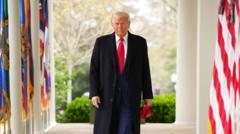As Donald Trump's reciprocal tariffs loom, nations scramble to negotiate amid fears of an economic cliff.
**Trump's Tariff Standoff: The Global Economic Game of Chicken**

**Trump's Tariff Standoff: The Global Economic Game of Chicken**
A day before new tariffs are set to activate, Trump's bold strategies keep the world on edge.
In an intensifying standoff ahead of the imposition of Donald Trump's new tariffs, the global economy trembles on the brink. With just a day before the tariffs take effect, countries designated as "worst offenders" are urgently seeking to mend relations with the United States, aiming to avert a disastrous escalation. However, China has adopted a stance of defiance, vowing to retaliate against American measures, complicating negotiations.
President Trump remains resolute despite burgeoning concern from allies in Congress and on Wall Street, who question whether he is overstepping his boundaries. When queried about potential market drops, he dismissed the inquiry, leaving investors uncertain. Observers speculate whether this is a strategic negotiation ploy or part of a more extensive agenda to redefine the global economic landscape.
On Monday, Israeli Prime Minister Benjamin Netanyahu became the first world leader to engage directly, promising to reduce trade barriers and eliminate Israel’s surplus with the U.S. Simultaneously, Japan and the European Union have signaled willingness to negotiate tariff reductions, hoping to curry favor with the Trump administration. Trump's commendation of the EU's offer, however, came with assertions that it still wasn't satisfactory.
In stark contrast, China has declared its intention to impose reciprocal tariffs in response to the U.S. threats, indicating a willingness to endure economic repercussions without backpedaling. The Chinese Embassy clearly stated that threats would not alter their position, underscoring the tensions between the superpowers.
Financial markets reacted to the tariffs' volatility, leading to steep fluctuations. Many business leaders—once unwavering Trump supporters—have voiced concerns regarding the potential fallout of his policies. Notably, a rapid spike in U.S. stock indexes occurred upon a misconstrued report suggesting a delay in new tariffs, which diminished quickly as the White House refuted the claim.
Trump has reinforced this combative approach, stating he isn't considering any delays and pressing on with his tariff strategy. Meanwhile, his trade advisor, Peter Navarro, asserted that the situation is not a negotiation, signaling that significant changes in global trade dynamics are underway.
A conjecture gaining traction among analysts is that Trump is pursuing a major overhaul of trade policies, possibly with an intention to weaken the U.S. dollar against foreign currencies, which might increase U.S. export competitiveness. Yet, this theory remains contentious among economists.
As Trump's strategies unfold and the deadline approaches, global leaders and business executives remain in a state of suspense, uncertain of the administration's ultimate aims and the potential consequences for the international economy. The stakes are high as the world awaits the implications of Trump's forthcoming tariffs.




















